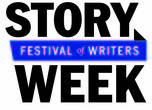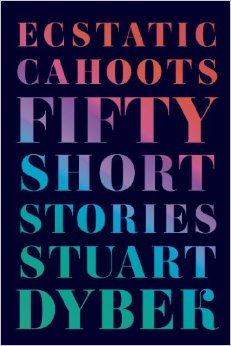| « Chicago Zine Fest is Back for its Fifth Year! | Bookmarks » |
Events Thu Mar 13 2014
Short and Sweet: A Conversation with Chicago Writer Stuart Dybek
Next week marks the return of one of Chicago's most beloved literary events, Columbia College Chicago's Story Week Festival of Writers. Beginning on March 16 through the 21, Story Week aims to build "a city of words" says Randy Albers, founding producer of the festival and writing faculty at Columbia College, in the Story Week welcome message. This year's theme is DiverCity, the connection between diversity and the urban landscape and how they come together to celebrate the power of urban stories.

Chicago has a great many writers who exemplify this festival's theme. One of Chicago's notable writers Stuart Dybek, will be featured at the festival. He is author of the fiction Childhood and Other Neighborhoods, The Coast of Chicago, I Sailed with Magellan, and the poetry collections Brass Knuckles and Streets in their Own Ink. He has two upcoming story collections, Ecstatic Cahoots and Paper Lantern, which will be released in June. In his writing, the city acts as a back drop, a kinetic character. Dybek will help Albers vision this year in building a 'city of words'.
I got to ask Dybek a few questions about his new books, his events at Story Week and about the short story in general.
You will be on the Story Week panel, "Why the Short Story". You're definitely an authority on the subject with your previous fiction collections and your upcoming releases. What draws you to writing in that format?
Let me preface my answer by saying that some of the aspects that draw me to the short story are certainly not exclusive to the short story. There's a considerable overlap between literary genres and its far more accurate to see genres as arranged along a continuum rather than to treat them as if they inhabit separate gated communities. For me the short story is a good form in which to work with a kind of literary version of chamber music. Because of the scale of the story one can crank up and try to sustain intensity without fatiguing the reader. One might, of course, say the same about poetry, and an often heard observation about the short story form is that the compression it demands gives it a closer kinship to the poem than to the novel. I've long been fascinated by story collections that have some kind of unity--unity of place like Dubliners or Winesberg, Ohio , for instance, or unity of characters and action such as The Things They Carried. Sometimes such collections are given the paradoxical name, the novel in stories, which is misleading. The so called unity of such books actually emphasizes the fragmentary nature of personal life and of community. That sense of finding order, or at least patterns, within fragmentation is central to modernism.
Story collections for a long time were a tough sell for publishers to release. Do you feel there has been resurgence in the market for short story collections?
The space granted to the story in mass market magazines has largely been given over to nonfiction. The story though continues to have a vital life in literary magazines. We're living in an age when nonfiction at least in the US is not only the ascendant but the dominant form. There's still a market for fiction, of course, including what's called literary fiction. In that market the novel is a far more commercial form than story collections. But as you observe in the last several years several story collections have had both critical and even some commercial success. There have been several articles written on the subject, especially following events such as the deserved welcome last year for George Saunders' 10th of December.

You have two story collections coming out this year Ecstatic Cahoots and Paper Lantern. Releasing one book seems like a lot of work. How has releasing two books at once made the process?
A lot of work times 2. In my grad fiction workshop last week, we read and critiqued an interesting story by one of the students that was substantial enough to deserve yet more work, and she said, I already have three years into this piece, and around the table there was a look on most every face of "I know of what you speak." And I said, "Shhh! We keep that a secret from the reader."
You will be reading selections from these new works during Story Week. Are you also going on a reading tour this spring in support? What was your process for selecting new material to share with your audience?
I will be doing some readings this spring in various places but for the most part the book tour of old is no more. What's advertised as a big tour these days would have been only standard ten years ago. Many papers no longer have book sections, there are less independent book stories, conditions have changed radically in the time when my last book appeared and it was common to tour the West Coast, the East, the South. Reading a story to an audience means that the audience is listening. Listening asks something a little different of a person than opening a book and reading it does, so, when I select what to read aloud I try to keep that in mind. The stories in my book Paper Lantern are mostly too long to read in their entirety so probably I'll read something out of Ecstatic Cahoots.
Love is a common theme in many of your stories (Paper Lantern is listed as love stories). Not love in the supermarket paperback sort of way. You dig into characters and find their raw emotions, their hopes, and connect characters on such a human level. What drives you to writing about love and relationships?
One of the stories in Paper Lantern begins with an epigraph from St. Therese of Lisieux's The Story of a Soul: "Let us love, since our heart is made for nothing else." Could Elvis have said it better? It doesn't matter that St. Therese is speaking of a spiritual love--you turn the radio to any pop station and hear the same message crooned, throbbing, whispered in hundreds of different ways. There's a myth that the Eskimo's have a hundred names for snow. I've read that in reality it is two or three names at most, but it's a lovely idea, an idea one wants to believe. And let's say that if it sounds credible that there can be a hundred words for snow, then how many words might there be for love? How many shapes and shadows can eros--the life force--assume? The act of writing a story, so closely connected as it is to memory, is by nature erotic, that is the storyteller attempts to swim salmon-like upstream against time and death by preserving in language the repeatable imprint of life.
Dybek will be a guest at Story Week on Monday March 17th. At 2pm Dybek will be part of the panel, Conversation/Q&A: Why the Short Story? , featuring Roxane Gay (An Untamed State), Katey Schultz (Flashes of War), and Christine Sneed (Little Known Facts), hosted by host Columbia Creative Writing faculty member Patricia Ann McNair (Temple of Air).
Then at 6pm, Dybek will be holding a conversation, reading, and book signing with host Donna Seaman, Booklist Senior Editor. This event will include ASL interpretation.
Both events are at the Harold Washington Library, 400 South State Street. All Story Week events are free and open to the public.









